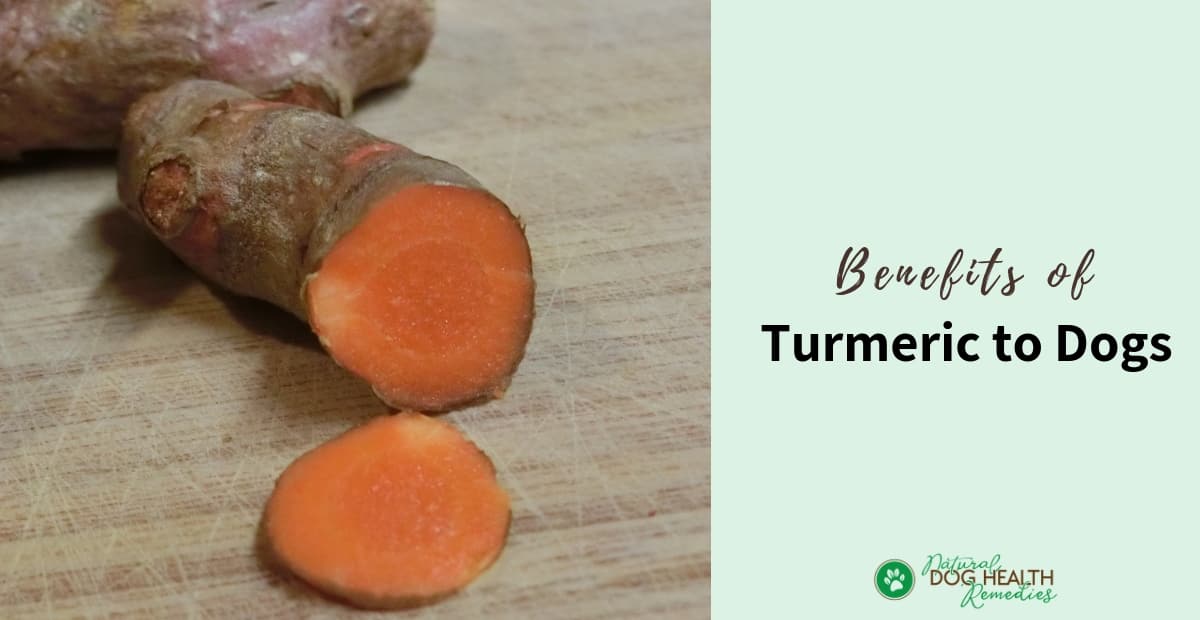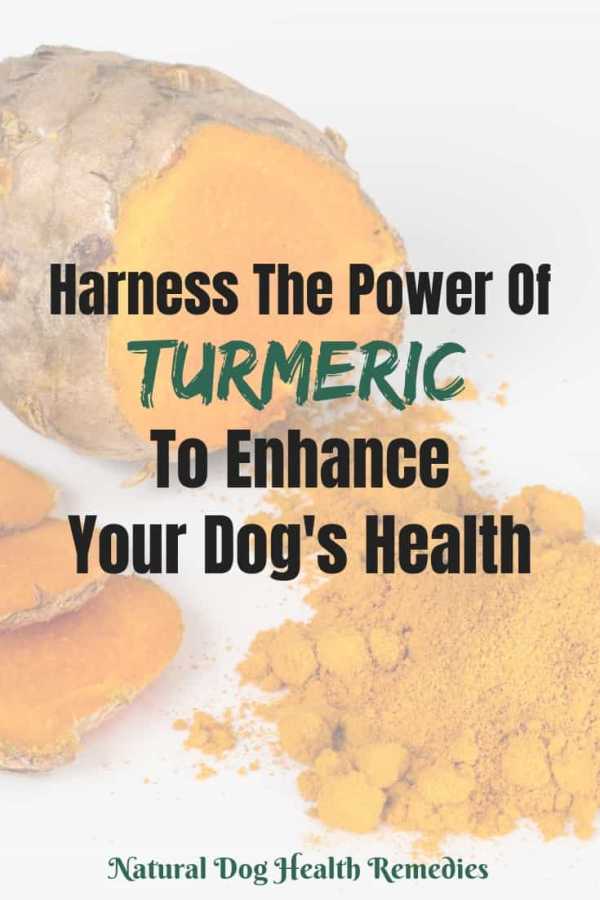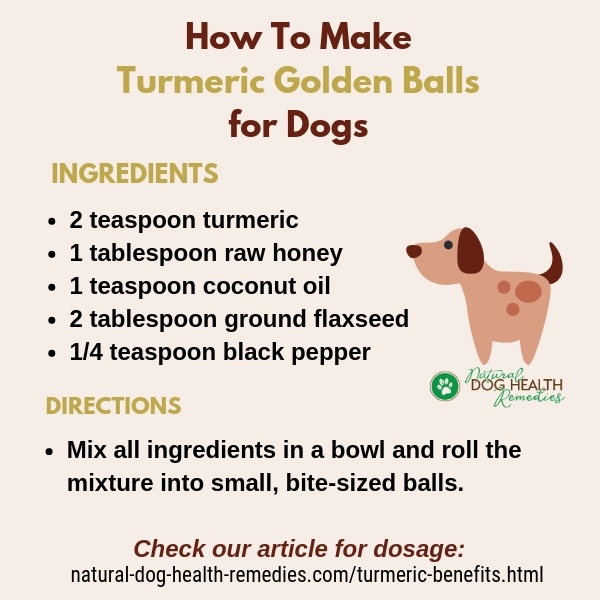Turmeric Benefits for Dogs
(FTC Disclosure: If you make a purchase via a link on this page, I may receive a small commission, at no added cost to you.)

Overview
With all the buzz about turmeric in recent years, you most likely have heard about this herb or may even be using it for yourself and your family.
The good news is, turmeric benefits dogs in numerous ways as well.
Turmeric belongs to the ginger family and contains a mix of phenolics known as curcumin. It is the curcumin in turmeric that makes this herb so medicinally powerful.
In addition, turmeric is high in vitamin B6 and minerals (manganese, iron, potassium) and contains a good source of fiber.
This page looks at the following:
- Benefits of Turmeric for Dogs
- Dosage and How to Give
- Safety and Precautions
- How to Make Turmeric Golden Balls
Benefits of Turmeric to Dogs
We can definitely use this herb to help with the following health issues:
Inflammation Problems
Turmeric is a powerful antioxidant and has anti-inflammatory and antimicrobial properties. The anti-inflammatory effects of this herb are comparable to those of cortisone, and the antioxidant effects are comparable to those of vitamins C and E.
Turmeric is therefore a good herb to use on dogs with chronic inflammation, such as skin problems, arthritis and joint pain.
Liver Problems
Turmeric has liver supporting and protecting properties. It stimulates the output of bile (by as much as 100%!) and increases its solubility.
If your dog has a mild liver problem, use turmeric to help protect his liver from deteriorating further faster.
If your dog's liver symptoms are more severe, add milk thistle to the mix.
Digestive Problems
Got a gassy dog? Add turmeric to his food and let the herb help decrease gas formation in the GI tract.
Turmeric is a carminative, that is, it can help to prevent gas formation in the GI tract. In addition, it can improve digestion because it stimulates the secretion of enzymes.
Cancers
It has been found that turmeric has the ability to interfere in all steps of cancer formation: initiation, promotion and progression.
To put it very simply: turmeric is able to cause cancer cells to end their lifecycle prematurely - in other words, it can cause the cancer cells to commit suicide!
If your dog has unfortunately been diagnosed with cancer, you should definitely add turmeric to his food daily to help fight cancer.
Health Tonic

Turmeric also benefits the cardiovascular system.
Also, a number of studies have suggested that turmeric can protect people against Alzheimer's disease.
The curcumin in the herb triggers the production of an antioxidant that protects the brain against free radicals.
Old dogs can also develop doggie dementia, and though no studies on dogs have been found, it does not hurt to add this herb to an old dog's diet.
If you have an old dog, definitely it is a good idea to add turmeric to his food to help support his heart, and as a general antioxidant to prevent cognitive dysfunction and cancer.
Dosage and How to Give Turmeric to Dogs
As a Tonic or For Issues Other Than Cancer
The easiest way to give turmeric to dogs is to use the dried, powdered form of the herb (be sure to get an organic product such as this one):
Dosage depends naturally on the size of your dog, but as a very rough guide, start off with these dosages:
- Small Dogs (10-20 pounds): 1/4 teaspoon daily.
- Medium Dogs (20-50 pounds): 1/2 teaspoon daily.
- Large Dogs (50-100 pounds): 1 teaspoon daily.
Dr. Randy Kidd (author of Herbal Dog Care) suggests that the simplest way is to sprinkle the dried herb on the dog's food.
As turmeric is fat soluble, it may be better to first mix the herb with an oil (e.g. olive oil or coconut oil), and add the herbal oil mix to the dog's food.
If you home-cook for your dog, you can also simply add the herb to the food during cooking.
For Cancer Treatment
Dr. Dressler (author of Dog Cancer Survival Guide) suggests giving it between meals, at least 1 hour before or after food, on a totally empty stomach.
According to Dr. Dressler, the following dosages are appropriate for cancer treatment:
- Miniature breeds: 50 mg, 3 times daily.
- Small breeds (up to 35 lb): 100 mg, 3 times daily.
- 36-60 lb: 200 mg, 3 times daily.
- Over 60 lb: 250 mg, 3 times daily.
Is Turmeric Safe for Dogs?
Turmeric is a very safe herb for dogs, and there seems to be no toxicity reported at normal intake levels. Do not, however, overfeed it to your dog since large amounts may cause inflammation or ulceration of the stomach lining.
In addition, please note the following:
- Since turmeric has blood-thinning properties, do not use it 10-14 days before surgery. Also if your dog is on blood-thinning medications (e.g. warfarin), consult with your vet before giving turmeric to your dog.
- Research has found that turmeric can increase the risk of developing bladder stones since the herb is high in soluble oxalates. Turmeric, therefore, should not be used on dogs who are prone to the formation of oxalate bladder stones.
- If your dog has stomach ulcers, do not use this herb since, according to the University of Maryland Medical Center, there is some evidence that turmeric may increase stomach acid, making existing ulcers worse.
- If your dog is on anti-inflammatory drugs (e.g. NSAIDs or corticosteroids), consult with your vet before giving turmeric to the dog. As the herb also has anti-inflammatory properties, the dosage of the synthetic drug may have to be adjusted.
- Consult a vet first before giving turmeric to diabetic dogs. According to the University of Maryland Medical Center, turmeric may lower blood sugar levels and, when combined with medications for diabetes, could cause hypoglycemia (low blood sugar).
- Finally, note that the yellow pigment in the turmeric can stain light-colored surfaces. So don't be surprised to see a yellow mustache on your white haired dog if you put turmeric on her food, and don't let your dog eat on your white carpet!
How to Make Turmeric Golden Balls
Many dog parents want to know if they can make turmeric golden paste for their dogs, and if so, how.
It is definitely fine to feed golden paste to dogs, but I find making "golden balls" easier and less messy to give to dogs!
Here's what you need:
- 2 teaspoon turmeric
- 1 tablespoon raw honey
- 1 teaspoon coconut oil
- 2 tablespoon ground flaxseed
- 1/4 teaspoon black pepper
Mix all ingredients in a bowl and roll the mixture into small, bite-sized balls.
How many balls to give your dog a day depends on the size of your dog and how many balls you end up with. For example, if you have 20 balls, and your dog is medium size, 5 balls will have about 1/2 teaspoon of turmeric, the daily dosage for medium-sized dogs.
The added honey makes it more palatable for dogs, and honey also has a lot of health benefits to dogs!
You can of course adjust the recipe to make a bigger batch. Just store the balls in an air-tight container in the fridge for up to one month.

 References
References
D. Dressler, The Dog Cancer Survival Guide: Full Spectrum Treatments to Optimize Your Dog's Life Quality and Longevity (Kindle Edition, 2011).
R. Kidd, Dr. Kidd's Guide to Herbal Dog Care (Storey Publishing, 2000).
S. Messonnier, The Natural Vet's Guide to Preventing and Treating Cancer in Dogs (New World Library, 2006).
Curcumin and Cancer Cells: How Many Ways Can Curry Kill Tumor Cells Selectively?





